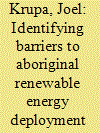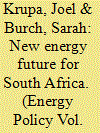| Srl | Item |
| 1 |
ID:
111464


|
|
|
|
|
| Publication |
2012.
|
| Summary/Abstract |
As one of the largest and wealthiest countries in the world, Canada stands well-positioned to take advantage of ongoing growth in North American demand for primary energy supply by expanding domestic delivery of renewable energy generation to internationally interconnected electric grids across the country. There are myriad benefits of adopting the renewable energy approach to development-as the province of Ontario has acknowledged through the implementation of their 2009 Green Energy Act-including drastic reductions in carbon emissions, the decommissioning of existing fossil fuel power generation that cause serious public health problems, and opportunities for sustainable development at the community level.
One group in particular stands poised to shape these debates. In Canada, historically marginalized Aboriginal peoples remain one of the groups with the greatest potential for meeting these enormous renewable energy deployment needs. Aboriginal involvement in renewable energy generation in Canada has been as diverse as Canada's Aboriginal peoples and groups have already adopted a range of different solutions to meet energy supply needs. However, many significant barriers exist that prevent this diverse cultural group from reaching its full potential. The article identifies some of these shortcomings and analyzes their roots.
|
|
|
|
|
|
|
|
|
|
|
|
|
|
|
|
| 2 |
ID:
109659


|
|
|
|
|
| Publication |
2011.
|
| Summary/Abstract |
Renewable energy remains a contested topic in South Africa. This paper argues that South Africa can build on the momentum surrounding its introduction of a feed-in tariff by enacting policies that may, if given adequate funding and political effort, allow the country to be a world leader in renewable energy. Given a variety of renewable energy policy options for moving forward, a majority of stakeholders consulted in this study strongly prefer the development of a renewable energy manufacturing cluster, in which government develops coordinated policy mechanisms that attract renewable energy manufacturers, over three other policies suggested by the authors. Interviews with key informants that play critical roles in this decision-making process suggest that there are reasons to remain cautiously optimistic about the country's renewable energy future while cognizant of the challenges that must still be overcome. Opportunities for a low carbon renewable energy transition in South Africa include the prevalence of broad stakeholder consultation, facilitated by civil society, and an innovative policy development context. Significant impediments also exist, however, and include pervasive social issues such as poverty and political inertia, along with the ongoing difficulties facing renewable energy technologies in reaching grid parity with inexpensive and abundant South African coal.
|
|
|
|
|
|
|
|
|
|
|
|
|
|
|
|